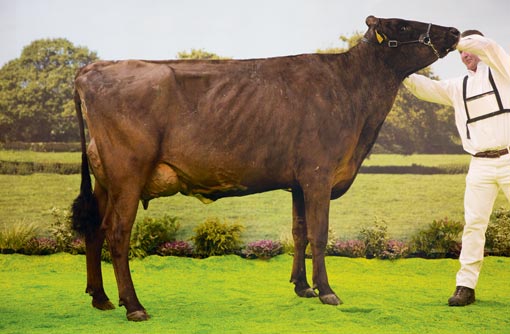Brown Swiss success at showing

“The cattle world’s best-kept secret” – that’s how Robert McColm describes his Brown Swiss cows. But it’s a secret members of the McColm family are keen to share, which is why they’ll be making the long journey to the Livestock Event from their farm in Wigtownshire.
Robert and Sheila McColm, with children Daniel and Lorna, run 120 cows – predominantly Brown Swiss and Brown Swiss x Holstein at their Soulseat herd based at Stranraer.
The breed first arrived on the farm about seven years ago after a search for a change of breed that would provide higher milk constituents to meet the needs of the family’s milk contract supplying the Caledonian Cheese Company.
“To get the best milk price we can we need to produce high levels of fat and protein and so we were looking for a breed that would fit into our system,” says Mr McColm of High Boreland Farm, Lochans.
The qualities of the Brown Swiss came to the family’s notice at the 2006 AgriScot event and led to the first cattle arriving on the farm the following year.
MILK QUALITY
“I was prepared to switch to a breed to give me better milk quality and sacrifice some yield if I had to, but the Brown Swiss genetics have given me the lift in constituents without having to forfeit any milk” says Mr McColm.
The Brown Swiss Cattle Society is holding its national show at the Livestock Event. With six entries from the Soulseat herd, the McColms will be hoping to build on their recent run of wins, which have included the breed championship and reserve at this year’s Dairy Expo at Carlisle.
“As a family we’ve taken to showing and really enjoy it. There’s a lot of hard work involved, but it’s a team effort and a great opportunity to promote the breed too.”
Although Mr McColm admits to fellow breeders “twisting his arm” to start showing cattle, the family now rarely misses an opportunity to put the cattle on parade.
Good results at previous Dairy Events have kept the family committed to supporting the show’s breed classes. Last year, the family accounted for the junior reserve championship with a maiden heifer. .
The champion was the home-bred second calver Soulseat Jublend Beatrice – a Brown Swiss x Holstein by Jublend. She was giving 36kg at the event from a January calving and was making her show ring debut. Herdmate Highlight Proview Roseanna, a sixth calver, stood reserve.
“The Brown Swiss Society allows cross-breds to be shown provided they are 50% Brown Swiss, but all our cross-breds will go back to the Brown Swiss bull as we continue to grade-up these cattle to add to our 70 pure cows.
“I like to think the Brown Swiss is where the Holstein was just before things really took off. Showing is going to become even more important for the breed to make sure more dairy farmers can see these cattle and appreciate all the qualities the Brown Swiss has to offer.”
The herd is currently averaging just over 8,000kg at 4.25% fat and protein 3.47%. “And those figures are based on about 40 Holsteins we still have in the herd,” he says.
The best Brown Swiss, including a daughter of Jolt, are giving more than 10,000kg. But as well as being delighted with the way the breed has performed over the past six years, the McColms say the Brown Swiss is an exceptionally easy cow to manage.
“We’ve just had a batch of 16 heifers calve over three days. They are very quiet and good to handle from the start. As a breed it’s hard to understand why they haven’t become more popular. They are the cattle world’s best-kept secret – I just wish I’d discovered them sooner.”
As well as the breed’s yield, milk quality and ease of management the McColms say the Brown Swiss has excellent legs, exceptionally hard feet and good udders that last.
“We’ve got cows in their sixth and seventh lactations and they are just there in the herd – you hardly notice them. Visitors to the Brown Swiss show classes at the Livestock Event will see cattle that have come a long way over the past 20 years.
I suppose they could have been considered too dual-purpose in type in the early days but the modern genetics – particularly from Germany – are producing the type of cow that meets the needs of modern dairy farming and yet is still strong and robust.
“The German sires are giving us a strong animal with great constitution as well as milk and milk quality, but we’re also using American genetics.”
Keep up to date with the latest Livestock 2013 news
